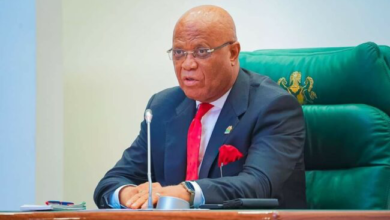NLC directs state chapters to embark on strike over non-negotiation of

*Says only Taraba yet to start negotiation
*Backs regional outfits to end
The Nigeria Labour Congress (NLC) has directed any of its state chapters to proceed on industrial action without recourse to the national headquarters once it is not satisfied with the speed of negotiation.
President of the NLC, Ayuba Wabba, who disclosed this in Abuja yesterday, hinted that only Taraba State is yet to take any step towards implementing the new national wage of N30,000 and the attendant consequential adjustment.
The Guardian reports that Wabba also expressed the support of Labour movement for regional security outfit such as the ‘Amotekun’ of the South West.
He listed Abia, Akwa Ibom, Anambra, Bayelsa, Borno, Delta, Ebonyi, Edo, FCT, Jigawa, Kaduna, Kano, Katsina, Kebbi, Lagos and Ondo as states that have signed agreement with labour while agreement has been reached but yet to be signed in Cross River, Enugu and Sokoto.
According to him, negotiation is ongoing in 17 states that include Adamawa, Bauchi, Benue, Ekiti, Gombe, Imo, Kogi, Kwara, Nasarawa, Niger, Ogun, Osun, Oyo, Plateua, Rivers, Yobe and Zamfara.
The NLC chief said implementation of the minimum wage and consequential agreement had begun in Borno, Delta, Ebonyi, Edo, FCT, Jigawa, Kaduna, Kano, Katsina, Kebbi, Lagos, Ondo, Sokoto and Yobe while implementation for levels one to six had commenced in Adamawa, Bauchi and Niger states.
He added that four states that include Abia, Akwa Ibom, Anambra and Bayelsa states are on the awaiting implementation status, while 16 states that comprise Benue, Cross River, Ekiti, Enugu, Gombe, Imo, Kogi, Kwara, Nasarawa, Ogun, Osun, Oyo, Plateau, Rivers, Taraba and Zamfara are yet to begin implementation.
Wabba, according to the Guardian, said the national secretariat of the NLC is willing to provide backup for any state that require additional manpower to ensure success of their industrial action.
Meanwhile, labour said it would support regional security outfit as part of the national security architecture aimed at restoring the security of persons and property in the country.





